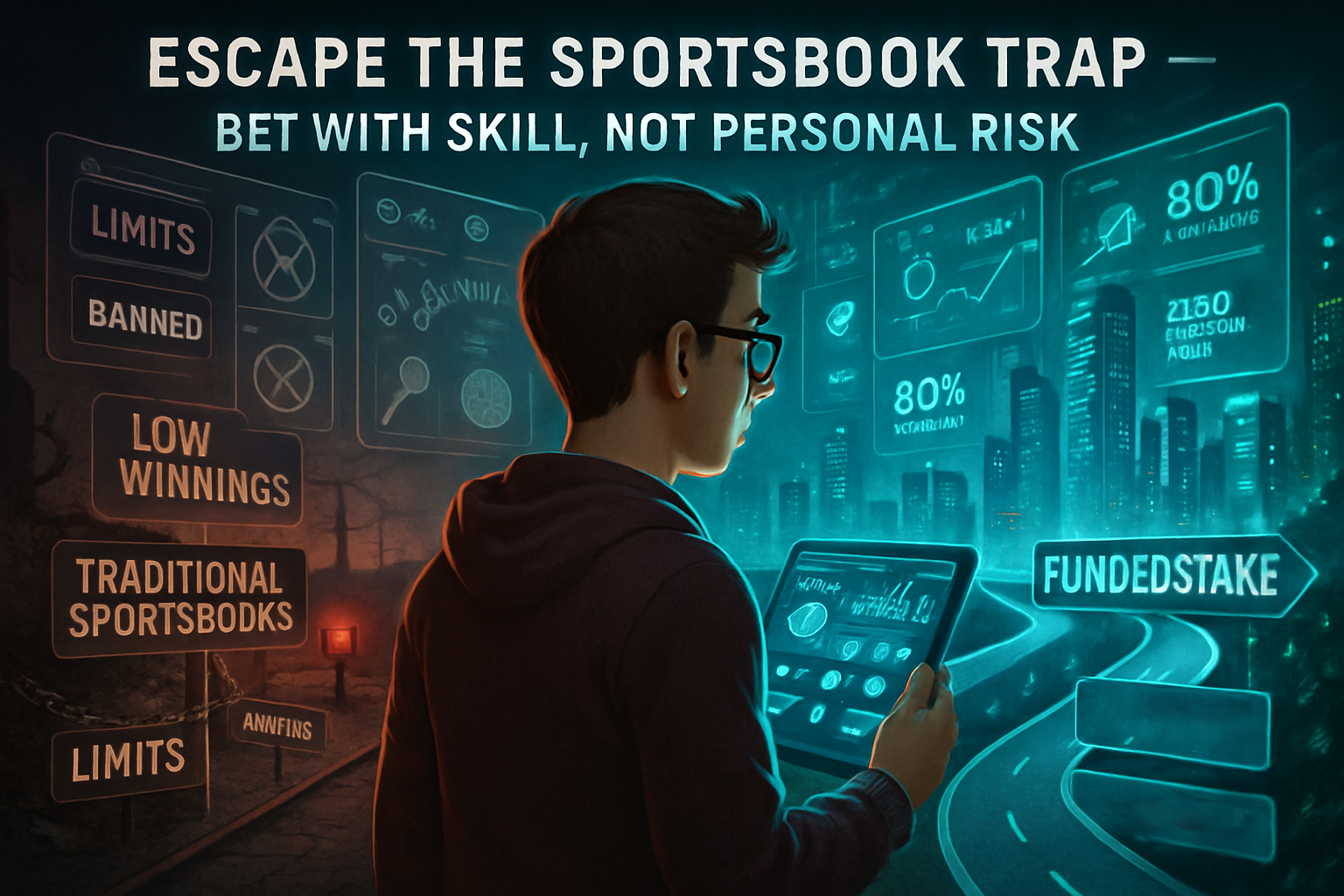Want to succeed in funded trading challenges? Emotional control is your key. Here’s why:
- Pressure is intense. You have to hit profit targets (like $3,300 on a $10,000 challenge) while staying within strict loss limits ($1,500 daily, $2,000 overall).
- Emotions can ruin strategies. Overconfidence, revenge trading, and mental fatigue lead to impulsive decisions.
- Staying calm improves results. Traders who manage emotions stick to plans, make smarter decisions, and achieve consistent outcomes.
Quick Breakdown of Funded Challenges
| Challenge Level | Virtual Capital | Profit Target | Max Loss Limit |
|---|---|---|---|
| Entry | $1,000 | $330 | $200 |
| Professional | $50,000 | $16,500 | $10,000 |
| Elite | $100,000 | $33,000 | $20,000 |
Want strong results? Focus on risk management, track emotional triggers, and maintain a steady routine. These skills ensure long-term trading success.
Mastering Emotional Control in Trading: Top 7 Strategies
Main Emotional Obstacles in Trading
Three major emotional hurdles can significantly impact your trading performance: overconfidence, revenge trading, and mental fatigue.
Managing Success: Avoiding Overconfidence
Winning streaks can easily lead to overconfidence, especially when handling larger account sizes like the $50,000 or $100,000 challenges. The higher stakes can tempt traders into risky behaviors.
Common mistakes include:
- Increasing bet sizes beyond the trading plan
- Opting for riskier, lower-probability trades
- Ignoring pre-set risk limits
For example, in a $10,000 challenge, careful position sizing is crucial. A single overconfident bet of $1,000 after a few wins could quickly breach the $1,500 daily loss limit.
Dealing with Losses: Preventing Revenge Trading
Managing losses becomes even harder under the time constraints of a 30-day challenge. The pressure to hit a 33% profit target often pushes traders into revenge trading – a cycle of emotional decision-making aimed at recovering losses.
| Emotional Trigger | Common Reaction | Potential Impact |
|---|---|---|
| Nearing Daily Loss Limit | Aggressive recovery attempts | Risk of exceeding the $1,500 cap |
| Series of Small Losses | Increasing bet sizes | Faster approach to max loss |
| Time Pressure | Rushed decision-making | Poor trade selection |
These reactions can quickly spiral, especially as mounting pressures lead to mental fatigue.
Handling Pressure and Mental Fatigue
Balancing the minimum trade requirements with profit targets creates intense mental strain. This pressure only grows as you get closer to either success or failure in your challenge.
Mental fatigue often results in:
- Decision paralysis
- Second-guessing your strategies
- Reactive, emotion-driven trades
With Funded Stake‘s bi-weekly reward system and 80% profit share structure, staying emotionally balanced is critical for long-term success. Even seasoned professionals face these emotional challenges – the difference lies in their ability to identify and address them before they derail their trading.
Next, we’ll explore tools and techniques to help you stay in control of your emotions while trading.
sbb-itb-6ef1185
Tools for Better Emotional Control
Recognizing Your Emotional Triggers
Understanding what sets off your emotions is key to staying composed during high-pressure situations. For example, in a $10,000 trading challenge, here are some moments to watch out for:
| Trading Situation | Emotional Trigger | Potential Impact |
|---|---|---|
| Approaching daily loss limit ($1,500) | Anxiety and panic | Rushed recovery attempts |
| Near profit target ($3,300) | Overconfidence | Risky, overly aggressive trades |
| Multiple consecutive losses | Frustration | Larger, impulsive bets |
| Time pressure (final week) | Stress | Poor, hasty decisions |
Keep a trading journal to track your emotional reactions and triggers. This practice helps you anticipate and handle similar situations in the future while laying the groundwork for setting clear trading boundaries.
Set Trading Boundaries
Establishing personal boundaries is crucial for managing both risk and emotions. Consider setting your own limits that are more conservative than the challenge’s maximums. This creates a safety net and reduces the risk of impulsive behavior. With boundaries in place, the next step is managing stress effectively.
Stress Management Techniques
Managing stress is essential to avoid overconfidence, revenge trading, or burnout. Here’s how you can approach it:
Before Trading:
- Review your trading plan and risk limits.
- Prepare your analysis thoroughly.
- Define clear entry and exit points.
During Trading:
- Take short, regular breaks to stay focused.
- Pay attention to physical signs of stress, like tension or rapid breathing.
- Record your trades and note any emotions that arise.
After Trading:
- Objectively review the day’s trades.
- Evaluate your performance without judgment.
- Clear your mind and reset before planning for the next session.
Results of Strong Emotional Control
Better Trading Decisions
Keeping emotions in check leads to smarter trading decisions. When traders focus on data and analysis rather than acting impulsively, they stick to well-thought-out plans and strategies.
During the $10,000 challenge, traders with emotional discipline consistently outperform in critical areas:
| Decision Area | With Emotional Control | Without Emotional Control |
|---|---|---|
| Risk Management | Sticks to the $1,500 daily loss limit | Takes bigger, riskier bets to recover losses |
| Pick Selection | Follows a pre-planned, structured strategy | Chases risky, impulsive opportunities |
| Position Sizing | Maintains a steady, calculated approach | Shows unpredictable size variations |
This disciplined mindset leads to more predictable and steady results.
More Consistent Outcomes
Traders who manage their emotions achieve steadier performance, avoiding the wild swings between big wins and heavy losses. This steadiness is critical for meeting profit goals, like the 33% target in trading challenges.
Key advantages include:
- Consistent position sizing that aligns with risk limits
- Balanced performance driven by systematic decisions
- Better risk control, reducing unexpected losses
Over time, this consistency becomes the backbone of long-term trading success.
Long-Term Success in Trading
Controlling emotions not only helps during challenges but also sets the stage for ongoing success as a funded trader. Three essential factors contribute to this:
-
Strong Risk Management
- Thoughtful position sizing and clear exit strategies
- Well-defined risk limits
- Execution based on a systematic plan
-
Strategic Consistency
- Adherence to trading plans, even in changing markets
- Regularly reviewing and refining performance
- Staying focused on process over outcomes
-
Ongoing Professional Growth
- Tracking performance to identify areas for improvement
- Recognizing and managing emotional triggers
- Building resilience to handle market pressures
Conclusion: Building Emotional Control Skills
Emotional control plays a crucial role in achieving the 33% profit target in Funded Stake challenges. To develop this skill, focus on three main areas:
First, use a structured risk management framework to stay disciplined during the $10,000 challenge. This involves sticking to predefined risk limits and executing trades systematically, without letting emotions take over.
Second, regularly evaluate your performance to spot emotional triggers before they affect your decisions. Successful traders not only track results but also monitor their emotional state during each choice. This builds self-awareness and helps prevent rash actions.
Third, establish a routine that ensures stability over the long term. Recognizing your triggers and adhering to a disciplined plan strengthens your overall strategy. Key practices include:
- Setting daily profit targets aligned with the 33% goal
- Taking regular breaks to maintain focus and mental clarity
- Reviewing performance data objectively before making new decisions
Emotional control is essential whether you’re dealing with losses or wins. To recap: prioritize risk management, evaluate consistently, and maintain a stable routine. These strategies work together to improve your chances of success and build a foundation for steady trading performance.
Developing emotional resilience takes time, but it’s a worthwhile effort. The skills you gain during this process will help you transition from a challenge participant to a funded trader. Clear thinking and disciplined execution are the cornerstones of achieving consistent results in sports betting.



